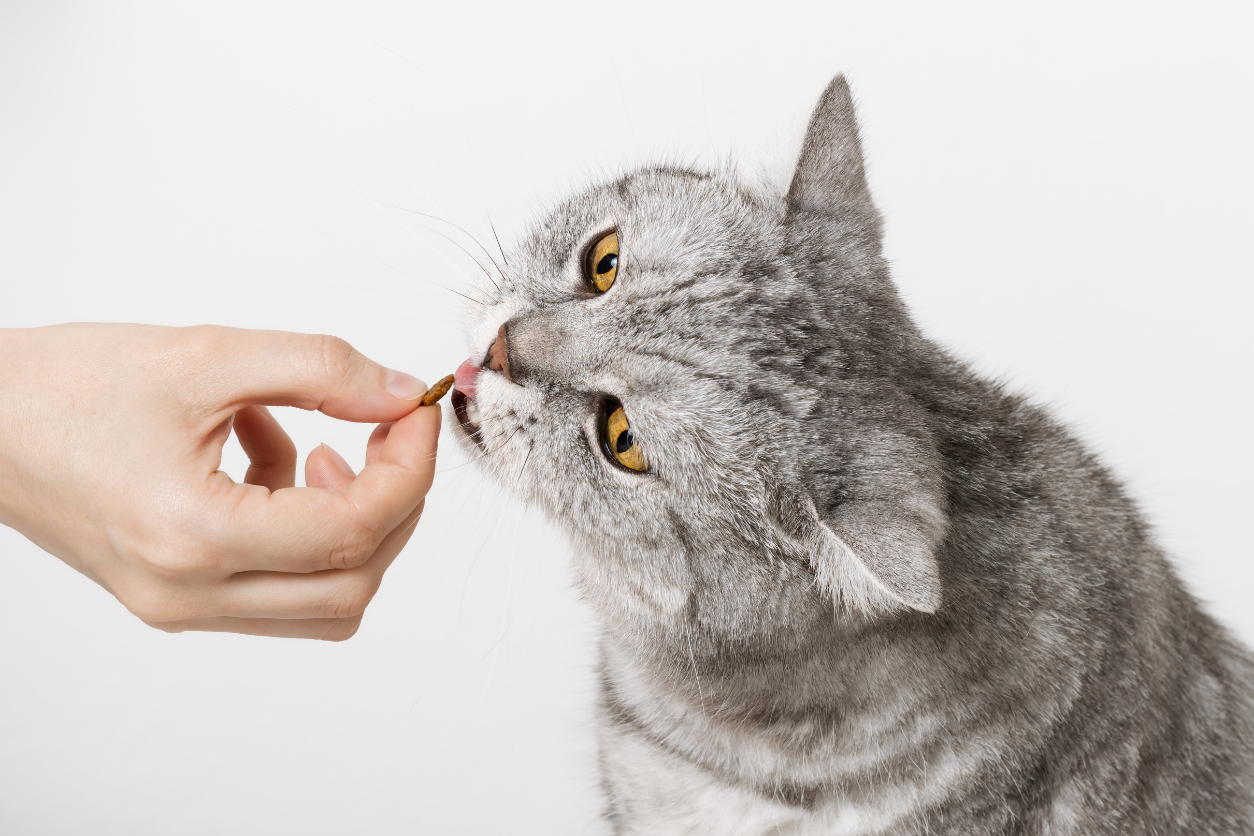What Human Foods Can Cats Eat?

As a cat owner, you may be tempted to share your meals or snacks with your feline friend, but it not all human foods are safe for cats to eat. While cats are carnivores and require a diet primarily consisting of meat, there are certain human foods that can be safely offered to them in moderation as treats.
In this post, we will explore some human foods that are safe for cats to eat. We will also provide guidelines on how to offer them to your furry friend and cover some other important things you should know before doing so.
What To Know Before Feeding Your Cat Human Food
It’s crucial to keep in mind that human food should not make up a significant portion of your cat’s diet. A balanced and complete diet of wet or dry cat food that meets their nutritional requirements is the best option for their overall health and well-being. When offering human food as treats to your cat, always do so occasionally and avoid foods high in fat, salt, sugar, or seasonings, as they can potentially cause harm to your cat’s health. If you have any doubts or concerns about offering human food to your cat, it’s best to consult your veterinarian for personalized advice.
Human Foods That Cats Can Eat
Cooked Meat
Cats are natural hunters and meat-eaters, so it’s no surprise that cooked meat can be a feline-friendly treat. A little bit of cooked chicken, turkey, beef, and pork can be offered to cats as a source of protein. However, it’s important to ensure that the meat is thoroughly cooked without any seasonings, sauces, or added ingredients that can be harmful to cats. Avoid feeding your cat raw or undercooked meat, as it may contain bacteria that can cause gastrointestinal upset.
Fish
Fish is another human food that cats may enjoy as a treat, but it’s important to be cautious with the type of fish and the frequency of feeding. Cats can eat cooked, boneless fish such as salmon, tuna, and whitefish in moderation. Fish can be a good source of omega-3 fatty acids, which are beneficial for a cat’s skin, coat, and overall health. However, too much fish can lead to a thiamine deficiency in cats, so it’s best to limit it to occasional indulgences.
Eggs
Eggs can be a nutritious treat for cats, as they are a good source of protein and essential vitamins and minerals. Cooked eggs, such as scrambled or boiled eggs, can be offered to cats as a treat. Avoid feeding raw eggs to cats, however, as they can contain harmful bacteria such as salmonella.
Vegetables
While cats are carnivores, some vegetables can be safely offered as treats in small amounts. Steamed or boiled vegetables such as carrots, green beans, and peas can be a source of fiber and provide some added nutritional value to your cat’s diet. It’s important to remember that cats do not require vegetables in their diet and their digestive system is not designed to efficiently process plant-based foods, so always offer vegetables as a supplementary treat and not as a replacement for their regular food. Avoid feeding cats vegetables such as onions, garlic, leeks, scallions, shallots, and chives, however, as they can harm their digestive system and overall health.
Cheese
Many cats are lactose intolerant, which means they have difficulty digesting lactose, a sugar in milk and dairy products. Some cats, however, may tolerate small amounts of cheese as an occasional treat. Hard and aged cheeses, such as cheddar or parmesan, are generally lower in lactose and may be better tolerated by cats compared to soft or fresh cheeses. It’s important to monitor your cat for any signs of gastrointestinal upset after offering cheese and adjust accordingly.
Final Note!
Offering human food as treats can be a fun way to bond with your cat and provide them with some extra indulgences. But it’s important to follow guidelines and avoid foods that may be harmful to their health. Always offer human food in moderation and monitor your cat’s reaction check that they tolerate it well. If you have any questions or concerns about what human food is safe for your cat to eat, it’s best to consult with your veterinarian for personalized advice. Remember, the health and well-being of your cat should always be your top priority. By being informed and cautious about offering human food to your cat, you can ensure that they enjoy safe and enjoyable treats while maintaining a healthy and balanced diet. Your cat will thank you with purrs of appreciation!
Your Pet’s Best Interest, Always
At Pet Institute, we take pet care seriously. We're dedicated to transparency, impartiality, and the well-being of your pets in every article, review, and recommendation we provide. Our unwavering commitment to these principles ensures that you, our valued reader, always receive reliable and unbiased information. Let us be your trusted guide in the world of pet care and companionship.